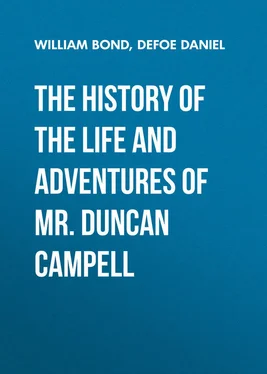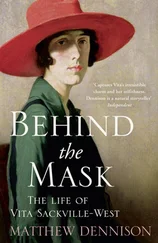William Bond - The History of the Life and Adventures of Mr. Duncan Campell
Здесь есть возможность читать онлайн «William Bond - The History of the Life and Adventures of Mr. Duncan Campell» — ознакомительный отрывок электронной книги совершенно бесплатно, а после прочтения отрывка купить полную версию. В некоторых случаях можно слушать аудио, скачать через торрент в формате fb2 и присутствует краткое содержание. Жанр: foreign_antique, foreign_prose, на английском языке. Описание произведения, (предисловие) а так же отзывы посетителей доступны на портале библиотеки ЛибКат.
- Название:The History of the Life and Adventures of Mr. Duncan Campell
- Автор:
- Жанр:
- Год:неизвестен
- ISBN:нет данных
- Рейтинг книги:5 / 5. Голосов: 1
-
Избранное:Добавить в избранное
- Отзывы:
-
Ваша оценка:
- 100
- 1
- 2
- 3
- 4
- 5
The History of the Life and Adventures of Mr. Duncan Campell: краткое содержание, описание и аннотация
Предлагаем к чтению аннотацию, описание, краткое содержание или предисловие (зависит от того, что написал сам автор книги «The History of the Life and Adventures of Mr. Duncan Campell»). Если вы не нашли необходимую информацию о книге — напишите в комментариях, мы постараемся отыскать её.
The History of the Life and Adventures of Mr. Duncan Campell — читать онлайн ознакомительный отрывок
Ниже представлен текст книги, разбитый по страницам. Система сохранения места последней прочитанной страницы, позволяет с удобством читать онлайн бесплатно книгу «The History of the Life and Adventures of Mr. Duncan Campell», без необходимости каждый раз заново искать на чём Вы остановились. Поставьте закладку, и сможете в любой момент перейти на страницу, на которой закончили чтение.
Интервал:
Закладка:
But I cannot conclude this without telling the handsome saying with which this child, when not quite six years old, as soon as he thought he could express himself well, paid his first acknowledgment to his master, and which promised how great his future genius was to be, when so witty a child ripened into man. The words he wrote to him were these, only altered into English from the Scotch.
Sir,
It is no little work you have accomplished. My thanks are too poor amends; the world, sir, shall give you thanks; for as I could not have expressed myself without your teaching me, so those that can talk, though they have eyes, cannot see the things which I can see, and shall tell them; so that in doing me this, you have done a general service to mankind.
CHAPTER III.
THE METHOD OF TEACHING DEAF AND DUMB PERSONS TO WRITE, READ, AND UNDERSTAND A LANGUAGE
It is, I must confess, in some measure, amazing to me that men, of any moderate share of learning, should not naturally conceive of themselves a plain reason for this art, and know how to account for the practicability of it, the moment they hear the proposition advanced; the reasons for it are so obvious to the very first consideration we can make about it. It will be likewise as amazing to me that the most ignorant should not conceive it, after so plain a reason is given them for it, as I am now going to set down.
To begin: how are children at first taught a language that can hear? are they not taught by sounds? and what are those sounds, but tokens and signs to the ear, importing and signifying such and such a thing? If, then, there can be signs made to the eye, agreed by the party teaching the child, that they signify such and such a thing, will not the eye of the child convey them to the mind, as well as the ear? They are indeed different marks to different senses, but both the one and the other do equally signify the same things or notions, according to the will of the teacher, and consequently must have an equal effect with the person who is to be instructed, for though the manners signifying are different, the things signified are the same.
For example; if, after having invented an alphabet upon the fingers, a master always keeps company with a deaf child, and teaches it to call for whatsoever it wants by such motions of the fingers which, if put down by letters, according to each invented motion of each finger, would form in writing a word of a thing which it wanted; might not he by these regular motions teach its eye the same notions of things, as sounds do to the ears of children that hear? The manner of teaching the alphabet by fingers, is plainly set down in the following table.
When the deaf child has learned by these motions a good stock of words, as children that hear first learn by sounds, we may, methinks, call not improperly, the fingers of such a dumb infant, its mouth, and the eye of such a deaf child, its ear. When he has learnt thus far, he must be taught to write the alphabet, according as it was adapted to the motions of his fingers; as for instance, the five vowels, a , e , i , o , u , by pointing to the top of the five fingers, and the other letters, b , c , d , &c., by such other place or posture of a finger, as in the above-mentioned table is set forth, or otherwise, it shall be agreed upon. When this is done, the marks B, R, E, A, D, and so of all other words, corresponding with such fingers, conveys through his eyes, unto his head, the same notion, viz., the thing signified, as the sound we give to those same letters, making the word 'bread,' do into our head, through the ears.
This once done, he may be easily taught to understand the parts of speech, as the verb, the noun, pronoun, &c., and so, by rules of grammar and syntax, to compound ideas, and connect his words into a language. The method of which, since it is plainly set forth in Doctor Wallis's letter to Mr. Beverly, I shall set it down by way of extract; that people in the same circumstances with the person we treat of, and of the like genius, may not have their talents lost for want of the like assistance.
When once a deaf person has learned so far as to understand the common discourse of others, and to express his mind tolerably well in writing, I see no room to doubt but that, provided nature has endowed him with a proper strength of genius, as other men that hear, he may become capable, upon farther improvement, of such farther knowledge as is attainable by reading. For I must here join with the learned Doctor Wallis in asserting, as to the present case before us, that no reason can be assigned why such a deaf person may not attain the understanding of a language as perfectly as those that hear; and with the same learned author I take upon me to lay down this proposition as certain, that allowing the deaf person the like time and exercise, as to other men is requisite in order to attain the perfection of a language, and the elegance of it, he may understand as well, and write as good language, as other men; and abating only what doth depend upon sound, as tones, cadences, and such punctilios, no whit inferior to what he might attain to, if he had his hearing as others have?
It is most natural, (as children learn the names of things), to furnish him by degrees with a nomenclator, containing a competent number of names of things common and obvious to the eye, that you may show the thing answering to such a name, and these digested under convenient titles, and placed under them in such convenient order, in several columns, or other orderly situation in the paper, as by their position best to express to the eye their relation or respect to one another. As contraries or correlatives one against the other, subordinates or appurtenances under their principle, which may serve as a kind of local memory.
Thus, in one paper, under the title mankind, may be placed, not confusedly, but in decent order, man, woman, child (boy, girl).
In another paper, under the title body, may be written, in like convenient order, head (hair, skin, ear), face, forehead, eye (eyelid, eyebrow), cheek, nose (nostril), mouth (lip, chin), neck, throat, back, breast, side (right side, left side), belly, shoulders, arm (elbow, wrist, hand, – back, palm), finger (thumb, buckle, nail), thigh, knee, leg (shin, calf, ancle), foot (heel, sole), toe.
And when he hath learned the import of words in each paper, let him write them in like manner, in distinct leaves or pages of a book, prepared for that purpose, to confirm his memory, and to have recourse to it upon occasion.
In a third paper, you may give him the inward parts; as skull (brain), throat (windpipe, gullet), stomach, guts, heart, lungs, liver, spleen, kidney, bladder (urine), vein (blood), bone (marrow), flesh, fat, &c.
In another paper, under the title beast, may be placed horse (stonehorse, gelding), mare (colt), bull (ox), cow, calf. Sheep, ram (wether), ewe (lamb), hog, boar, sow, pig, dog, (mastiff, hound, greyhound, spaniel), bitch (whelp, puppy), hare, rabbit, cat, mouse, rat, &c.
Under the title bird, or fowl, put cock, capon, hen, chick, goose (gander), gosling, duck (drake), swan, crow, kite, lark, &c.
Under the title fish, put pike, eel, place, salmon, lobster, crawfish, &c.
You may then put plants or vegetables under several heads or subdivisions of the same head; as tree (root, body, bark, bough, leaf, fruit), oak, ash, apple-tree, pear-tree, vine, &c. Fruit: apple, pear, plum, cherry, grape, nut, orange, lemon. Flower; rose, tulip, gilliflower herb, (weed), grass, corn, wheat, barley, rye, pea, bean.
And the like of inanimates; as heaven, sun, moon, star, element, earth, water, air, fire; and under the title earth, – clay, sand, gravel, stone. Metal; gold, silver, brass, copper, iron (steel), lead, tin (pewter), glass. Under the title water, put sea, pond, river, stream; under that of air, put light, dark, mist, fog, cloud, wind, rain, hail, snow, thunder, lightning, rainbow. Under that of fire; coal, flame, smoke, soot, ashes.
Читать дальшеИнтервал:
Закладка:
Похожие книги на «The History of the Life and Adventures of Mr. Duncan Campell»
Представляем Вашему вниманию похожие книги на «The History of the Life and Adventures of Mr. Duncan Campell» списком для выбора. Мы отобрали схожую по названию и смыслу литературу в надежде предоставить читателям больше вариантов отыскать новые, интересные, ещё непрочитанные произведения.
Обсуждение, отзывы о книге «The History of the Life and Adventures of Mr. Duncan Campell» и просто собственные мнения читателей. Оставьте ваши комментарии, напишите, что Вы думаете о произведении, его смысле или главных героях. Укажите что конкретно понравилось, а что нет, и почему Вы так считаете.












